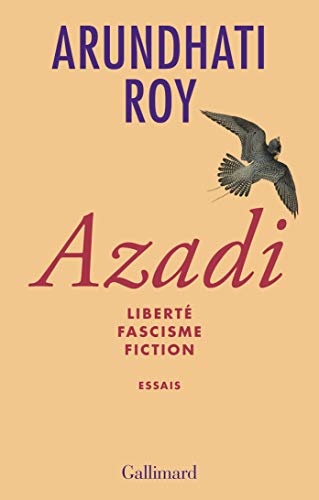
Azadi: Liberté - Fascisme - Fiction
Arundhati Roy
About the Author

Arundhati Roy
Questions & Answers
Arundhati Roy explores the themes of language, identity, and cultural belonging in India's diverse linguistic landscape and the rise of Hindu nationalism through her critical analysis and storytelling. She highlights the historical suppression of languages like Hindi and Urdu, which were replaced by Sanskrit, a language of the elite, rather than the everyday experiences of the people. This linguistic manipulation, she argues, aimed to homogenize and control the population, undermining the rich tapestry of India's linguistic diversity.
Roy also examines the role of language in identity and belonging, particularly through her novel "The Ministry of Utmost Happiness," where she portrays characters navigating multiple languages and dialects. This reflects the complex identities of individuals in India, who often straddle multiple cultural and linguistic backgrounds.
Furthermore, she critiques the rise of Hindu nationalism, which she views as a threat to India's secular fabric and cultural pluralism. By focusing on issues like the National Register of Citizens (NRC) and the Citizenship Amendment Act (CAA), Roy underscores how these policies marginalize Muslims and other minority groups, emphasizing the importance of cultural belonging and the need for a more inclusive society.
The author's focus on the experiences of marginalized communities in India, particularly Dalits, Muslims, and Adivasis, underscores the profound social and political challenges they face. This emphasis is significant because it highlights the systemic violence and discrimination these groups endure, often at the hands of the state and its institutions. By showcasing their struggles, the author underscores the need for justice, equality, and social reform. This focus also serves to humanize these communities, challenging the dominant narratives that dehumanize and marginalize them. It underscores the importance of recognizing the rights and dignity of all individuals, regardless of their social status, and calls for a more inclusive and equitable society.
Arundhati Roy challenges dominant narratives by providing nuanced perspectives on the conflicts in Jammu and Kashmir and the 2002 Gujarat pogroms. She emphasizes the human cost of these events, focusing on the suffering of individuals and communities. In the case of Jammu and Kashmir, she highlights the impact of the conflict on ordinary lives, including the use of AFSPA and the silencing of the Kashmiri voice. Regarding the Gujarat pogroms, she critiques the complicity of the state and the rise of Hindu nationalism, offering a detailed account of the violence and its aftermath. Roy's writing offers alternative perspectives by advocating for empathy, justice, and a critical examination of the political and social contexts that lead to such conflicts. She encourages readers to question established narratives and consider the experiences of marginalized groups.
The author's critique of the Indian government's COVID-19 response highlights several implications. Firstly, she emphasizes the government's failure to prioritize public health over economic interests, exemplified by the export of medical supplies while facing domestic shortages. This underscores the government's neglect of social welfare, particularly for the most vulnerable populations. Secondly, the author's focus on the government's use of the pandemic to further its nationalistic agenda, such as the "Azaadi" movement, reveals a concerning trend of using the state to promote a narrow, exclusionary nationalism. This is connected to broader issues of governance and social justice in India, as it indicates a government that prioritizes political gain over the well-being of its citizens, exacerbating existing inequalities and neglecting the needs of marginalized communities. The author's analysis underscores the urgent need for a more inclusive, just, and transparent governance system in India.
Arundhati Roy's work as a writer and activist is deeply intertwined, reflecting her commitment to social justice and critique of the political and social realities in India. Her writing often serves as a platform for activism, addressing issues like corruption, violence against minorities, and environmental degradation. Her novel "The God of Small Things" won the Booker Prize and brought international attention to the complex social dynamics in India.
Roy's essays, such as those in "Azadi," further demonstrate her role as an activist. She uses her platform to denounce the Indian government's actions, particularly those affecting marginalized communities, and to advocate for change. Her work reveals the challenges of being a writer in contemporary India, where she faces criticism, censorship, and even violence for her views. Despite these challenges, Roy remains a powerful voice for justice and freedom, highlighting the responsibility of writers to engage with and challenge the status quo. Her work underscores the importance of using literature as a tool for social change and the risks involved in doing so in a country with a complex political landscape.